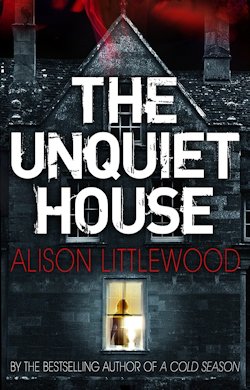Five months since her parents passed away, the bereaved, Emma Dean, inherits a house in West Fulford. Pleased to have a project to occupy her thoughts, she sets about renovating the place, but though Emma means to make Mire House magnificent once more, it seems the house has other plans for its mawkish new occupant. Days into her stay she ends up locked in a closet in an ordeal that takes its toll on the whole of Alison Littlewood’s sinister new novel.
It’s only thanks to the intervention of Charlie—a distant relative who really should have inherited the house—that Emma sees the light of day again. But has he come to help her? Or are his designs rather darker?
Forty years before Emma’s story, Frank Watts and his friends play a dangerous game on the property, tormenting its terrifying tenant: an old man who moved into Mire House many moons ago in the hope of having a family, but whose beloved wife died before she could give him children. Mr Owens has been on his own ever since—growing stranger by the day, so they say—to wit, when he catches Frank sneaking about his home, our boy expects a beating at the least. Instead, a bond of friendship forms between him and the formerly horrid householder… a bond that is tested when Frank’s perpetually distressed mother gets wind of it.
See, she too has ties to Mire House, as we learn in the text’s third section. In the late ’30s, when she was a farmer’s daughter dreaming of freedom, Aggie had hopes of playing the maid there, to a Mrs Hollingworth and her husband. But when tragedy strikes, her aspirations are dashed: as the world goes to war, the mother-to-be who would have been her mistress miscarries, cursing the property in her pain:
“I shall not live here. I shall not set so much as a foot in the place again. Did you know, I built that house for love?” She gave a sharp laugh. “For love. But love will never come to fill it. […] Such is my wish. There will be no laughter, no light, no life in that house. Do you hear me? And no children, not ever.”
Since the release of A Cold Season in early 2012 I’ve been calling its author a promising new voice in the horror genre. That’s not going to fly going forward, I’m afraid, given that Alison Littlewood has long since delivered on the implicit assurances of her fine first novel. Indeed, I’m pleased to report that she’s gone, in short order, from one to watch to a must-read, for me—and here she goes three for three.
The Unquiet House is a collection of novellas, essentially, each of which is interested in something significantly different. In the framing fiction, a young woman hopes to go her own way following the collapse of her family; in ‘The Second-Best Suit’—far and away my favourite of the tales—it dawns on a boy that appearances can be deeply deceiving; and in ‘The Last Stook,’ the war refutes the beautiful future Littlewood’s last protagonist imagines.
To a greater or lesser extent said stories certainly satisfy independently, but taken together, they depict the history of a harrowing haunting, into which document the author incorporates figures of folklore and the lay of local legend:
“You know, those old stories […] about the trees—some say they spread their roots ’round the graveyard to stop them who’s buried from coming back to the world. Others say that putting yew on a grace ’elps a soul find the other side. Some […] tell as ’ow it makes gateways. There’s one about how people eating yew—they get to see the other place. The after place. An’ then they come back.”
If there’s a single problem with the horror genre it’s that even the best and most successful authors often find themselves cornered: caught between explaining the inexplicable—and thus robbing it of its promise—and frustrating expectations by refusing to do so, peeving readers in the process. Many of Littlewood’s contemporaries have attempted to avoid this difficult decision by writing short novels that end unexpectedly, but short is something The Unquiet House is not. Admirably, it addresses the issue head-on instead, detailing a smart structural solution to the narrative problem posed.
That said, there are a couple of unsatisfying contrivances come the book’s conclusion, and in terms of character, Littlewood’s latest is, alas, lacking; Emma and Aggie are reasonably well developed, but only Frank felt real to me.
In every other respect, however, the author excels herself here. What Littlewood did with cults and motherhood in her debut, and fairy tales in the darkly fantastic crime fiction which followed it, she pulls off again, incredibly, in this best in class account of a haunted house.
The Unquiet House is available April 10th from Jo Fletcher Books (UK)
Niall Alexander is an extra-curricular English teacher who reads and writes about all things weird and wonderful for The Speculative Scotsman, Strange Horizons, and Tor.com. He’s been known to tweet, twoo.










